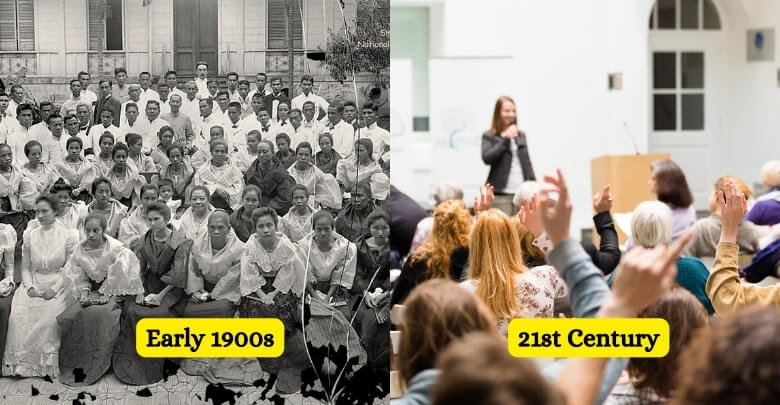The experience of being a conference organizer provides a wide variety of benefits, which include the opportunity to become an influencer in your field and develop valuable professional skills. But you may want to know more about, what is a conference organizer?
A conference organizer is the mastermind behind planning and managing successful events. The event coordinator is responsible for overseeing the entire event, from the earliest concept to the final execution, including coordinating with speakers, managing budgets, booking venues, arranging accommodations, and creating schedules to ensure that everything runs smoothly.
Interested in learning more about what makes a great conference organizer? If so, continue reading this article to find out what are the essential skills and responsibilities of this important role in the conference industry.
Historical Overview of A Conference Organizer
A conference organizer has played a crucial role in shaping professional gatherings over the decades. Basically, a conference organizer brings together individuals from various fields to exchange knowledge, network, and collaborate. These events have developed significantly, reflecting changing societal, technological, and industry trends.
Early Beginnings (Before the 20th Century)
The first meetings of philosophers and scientists were informal and not based on any specific role or profession. These early meetings originated in places like Athens and Alexandria. Scholars would congregate in public spaces, such as the Athenian Agora or the Lyceum, to discuss ideas and share knowledge without a structured framework or designated organizer.
The Start of Formal Conferences (Early 1900s)
In the early 1900s, professional groups and academic institutions held official conferences. They started organizing annual meetings to share research and ideas, which led to the conference organizer role. This role initially focused on tasks such as choosing locations, scheduling events, and inviting speakers.
Growing Demand for Organizers (Mid-1900s)
During the mid-1900s, the number of conferences increased dramatically. The result was the need for conference organizers who could handle all the details. Organizers began to handle budgets, arrange for speakers, and register attendees.
The Impact of Technology (Late 1900s – Early 2000s)
In the late 20th and early 21st centuries, technology changed how conferences were organized. The internet made it easier to market events, manage registrations, and connect with attendees. Various tools like online registration systems and virtual conferencing became more practical for organizers.
Conference Organizers Today (21st Century)
Conference organizers create events for a variety of purposes nowadays. It could include academic conferences, industry conventions, trade shows, and virtual events. In addition to creating engaging events that combine in-person and online elements, organizers also work to make events sustainable and inclusive. They use technology to create engaging experiences.
What is a Conference Organizer?
A conference organizer is responsible for planning and managing events. They handle everything from the initial concept to the final execution of a conference. This includes coordinating with speakers, managing budgets, and making sure all necessary details are in place for a successful event.
Assuring a smooth conference run is their responsibility. This includes tasks like booking venues, arranging accommodations, organizing transportation for attendees, and other key elements to organize a conference effectively and efficiently. They also handle registration, schedules, and any issues that arise during events like international arts conferences. Their role ensures everything runs smoothly, providing a successful experience for all participants.
Conference organizers play important roles in providing a positive experience for attendees. Their role is to ensure that the event meets the goals of the organizers and satisfies the needs of the participants. Their work involves a mix of strategic planning and hands-on problem-solving to deliver a well-organized conference.
Key Responsibilities of a Conference Organizer
The role of conference organizers is essential in ensuring the success of events and their achievement of aims. Each of their responsibilities contributes to the overall success of the conference. Here are some of the key responsibilities involved in this role:
Planning and Coordination
Make detailed plans for all aspects of the conference, including venue selection, scheduling, and budgeting. This involves coordinating with vendors, speakers, and team members to ensure every detail aligns with the event’s objectives and timeline.
Venue Selection and Management
Identify and secure a suitable venue for the conference that meets the event’s needs, such as location, capacity, and amenities. Manage logistics related to the venue, including setup, layout, and regulations compliance.
Marketing and Promotion
Create and execute a marketing strategy to promote the conference through various channels, such as social media, email campaigns, and partnerships. Develop promotional materials, manage online registrations, and drive attendee engagement.
Budgeting and Financial Management
Maintain a conference budget by estimating expenses, tracking costs, and securing sponsorships. It is very important to maintain a strict budget for the event and ensure that resources are allocated efficiently within the budget.
Relationship Building
You can get sponsored for conferences if you build relationships with sponsors, partners, and industry leaders. In addition to providing valuable sponsorship opportunities, these relationships can boost your event’s credibility and provide additional conference resources. Developing a strong network in the industry ensures you have the support needed to create successful and impactful events.
A successful conference requires a versatile and essential role for the organizer. They ensure that every detail aligns with the conference’s goals and provides a great experience for all attendees by managing planning, venue selection, marketing, budgeting, and relationship building.
Required Skills for Successful Conference Organizers
The process of organizing a conference is not easy. It requires a mix of skills to ensure everything runs smoothly. Here are the key abilities every successful conference organizer should have:
- Attention to Detail: Making sure every detail is correct prevents issues during the event. This includes reviewing schedules, contracts, and venue arrangements thoroughly.
- Strong Communication Skills: Clear communication with speakers, attendees, and vendors is essential. It helps manage expectations and addresses concerns effectively.
- Time Management Abilities: The time needed to organize a conference basically depends on management skills. Meeting deadlines and staying organized are essential to success.
- Problem-solving skills: Issues will arise, and quick, effective solutions are necessary. Resourcefulness helps handle unexpected challenges.
- Project Management Experience: Coordinating various tasks and team members is vital. Experience managing projects ensures well-organized projects.
- Financial Acumen: Budgeting and managing expenses are key responsibilities. Understanding financial planning helps keep the conference within budget.
- Leadership Qualities: Guiding a team and making decisions is part of the job. Strong leadership motivates team members and ensures smooth operations.
- Networking skills: Building relationships with vendors, sponsors, and participants is important. Networking can lead to valuable opportunities and partnerships.
- Technical Proficiency: Familiarity with event management software and technology is needed. This helps with registration systems and virtual platforms.
- Customer Service Expertise: Providing excellent service to attendees and speakers is a priority. An excellent customer service ensures a positive experience for everyone involved.
Success in conference organizing comes from a blend of these skills. Developing these abilities will help you run a successful event.
Challenges Faced by Conference Organizers
There are many moving parts and potential challenges involved in organizing a conference. Preparing for a successful event starts with understanding these challenges. Here are some common issues conference organizers face:
Managing Tight Budgets
It is challenging to balance expenses and revenue. Unexpected costs can arise, making budget management crucial to success. Careful planning avoids overspending.
Handling Last-Minute Changes
Plan and schedule changes can cause stress when they occur unexpectedly. Flexibility and quick decision-making are essential for managing these changes effectively. Staying adaptable ensures everything stays on track.
Ensuring Technical Setup Works Smoothly
There is a risk of technical issues disrupting presentations and sessions. Testing equipment in advance and having IT support on standby helps manage tech problems. Proper preparation ensures a steady experience.
Dealing with Diverse Attendee Needs
A variety of preferences and requirements must be accommodated. This includes managing dietary restrictions, accessibility needs, and varying expectations. Attendee experiences can be improved by understanding these needs.
Managing Event Logistics
The smooth operation of an event depends on the coordination of many details. It includes the setup of venues, transportation, and schedules. A careful plan will ensures efficiency.
Being aware of these challenges and preparing for them can make a big difference. Effective strategies and solutions help overcome these obstacles and lead to conference success.
Future Trends in Conference Organizers
The number of conference organizing is growing rapidly. Staying ahead of trends helps make sure future events succeed. The following trends will shape conference organizing in the future:
Increased Use of Artificial Intelligence
AI facilitates tasks like registration and attendee engagement. Chatbots and AI-driven analytics improve efficiency and offer personalized experiences. The use of AI can manage large-scale events smoothly.
Advanced Networking Opportunities
The use of new technologies at events is improving networking. Apps and platforms facilitate connections between attendees and sponsors. Advanced networking features build meaningful professional relationships.
Interactive and Engaging Content
Future conferences will focus on interactive sessions. Gamification, live polls, and breakout sessions keep attendees engaged. Innovative content formats improve participant involvement.
Personalization of Attendee Experiences
A growing trend is to customize experiences based on the preferences of attendees. Custom agendas and personalized recommendations improve satisfaction. The personalization of events makes them more enjoyable and relevant.
Use of Social Media for Engagement
During conferences, social media platforms are crucial for promoting and engaging attendees. Live updates, interactive posts, and event hashtags drive participation. Social media improves visibility and interaction between attendees.
By adapting to changes, event organizers can ensure that their events meet modern expectations and meet their objectives in the future.
Frequently Asked Questions
You can improve your career advancement and networking opportunities by attending a global conference. Here are some frequently asked questions and answers to guide you through this international experience.
What Qualifications Are Needed to Become a Conference Organizer?
Most conferences require a degree in a relevant field, such as business or event planning. Additionally, employers typically look for experience organizing conferences and events, as well as a strong understanding of international cultures. Finally, employers also look for organized and creative problem solvers.
How Do Conference Organizers Manage International Attendees and Cultural Differences?
A conference organizer must plan carefully to make sure that he or she has the necessary resources to handle international attendees. They must also understand cultural differences between countries and adjust their strategies accordingly. They must plan for any potential language barriers to ensure everyone understands each other.
What Are the Best Practices for Selecting a Conference Theme or Topic?
The audience’s interests should be considered when choosing a conference theme or topic. Ensure that the theme is relevant and relevant to the latest industry trends. The theme should be easy to understand and accessible to everyone.
How Can Conference Organizers Handle Last-Minute Cancellations or No-Shows?
It is advisable for organizers to put a limit on the number of participants or set a cap on attendance to cover cancellations and no-shows. A plan should also be in place to deal with overflow crowds, such as providing more seating or renting a larger facility. Additionally, they should contact no-shows in advance to ensure they know cancellation policies.
What Role Does Sustainability Play in Modern Conference Planning?
The planning of a conference sustainably can help reduce negative environmental impacts. This can be done by using renewable energy sources, reducing waste, and using sustainable materials. Additionally, by planning strategically, conferences can also utilize resources more efficiently and minimize their carbon footprint.
Final Thought
A successful event organizer will work hard to ensure that your event is a success by addressing key elements to organize a conference along with responsibilities such as budgeting, planning, and managing the diverse needs of your attendees in order to make your event a success.
Knowing “What is a conference organizer?” helps highlight the importance of skills such as attention to detail, strong communication, and effective problem-solving. It will also help you succeed in organizing impactful conferences if you embrace future trends and overcome common challenges.
The experience that you will gain from this will allow you to not only improve your career but also to positively influence your industry and have a significant impact on the future of your industry by positively influencing its development.








